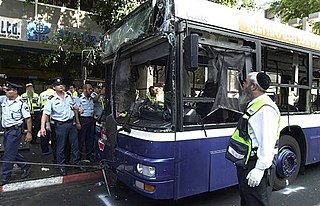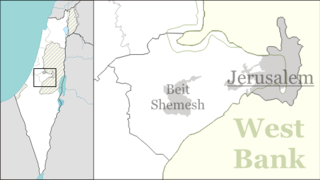| |||||
| Decades: | |||||
|---|---|---|---|---|---|
| See also: | |||||
Events in the year 2000 in the Palestinian territories .
| |||||
| Decades: | |||||
|---|---|---|---|---|---|
| See also: | |||||
Events in the year 2000 in the Palestinian territories .
Palestinian National Authority (non-state administrative authority)

The most prominent events related to the Israeli–Palestinian conflict which occurred during 2000 include:
Notable Palestinian militant operations against Israeli targets
| | This section needs expansion. You can help by adding to it. (August 2010) |
The most prominent Palestinian militant acts and operations committed against Israeli targets during 2000 include:
Notable Israeli military operations against Palestinian militancy targets
| | This section needs expansion. You can help by adding to it. (October 2010) |
The most prominent Israeli military counter-terrorism operations (military campaigns and military operations) carried out against Palestinian militants during 2000 include:

Mohammed Abdel Rahman Abdel Raouf al-Qudwa al-Husseini, popularly known as Yasser Arafat or by his kunya Abu Ammar, was a Palestinian political leader. He was Chairman of the Palestine Liberation Organization (PLO) from 1969 to 2004 and President of the Palestinian National Authority (PNA) from 1994 to 2004. Ideologically an Arab nationalist, he was a founding member of the Fatah political party, which he led from 1959 until 2004.
The year 2000 in Israel and Palestine marked the beginning of the al-Aqsa Intifada leading to a number of Palestinian and Israeli deaths.

The Second Intifada, also known as the Al-Aqsa Intifada, was a Palestinian uprising against Israel. The general triggers for the violence were proposed as the failure of the 2000 Camp David Summit to reach final agreement on the Israeli-Palestinian peace process in July 2000. The violence started in September 2000, after Ariel Sharon made a highly provocative visit to the Temple Mount. The visit itself was peaceful, but, as anticipated, it sparked protests and riots which the Israeli police put down with rubber bullets and tear gas.
Note: The death toll quoted here is just the sum of the listings. There may be many omissions from the list. The human rights organisation B'Tselem has complied statistics of about 600 deaths during 2003 in the occupied territories alone.

The Roadmap for peace or road map for peace was a plan to resolve the Israeli–Palestinian conflict proposed by the Quartet on the Middle East: the United States, the European Union, Russia and the United Nations. The principles of the plan, originally drafted by U.S. Foreign Service Officer Donald Blome, were first outlined by U.S. President George W. Bush in a speech on 24 June 2002, in which he called for an independent Palestinian state living side by side with Israel in peace. A draft version from the Bush administration was published as early as 14 November 2002. The final text was released on 30 April 2003. The process reached a deadlock early in phase I and the plan was never implemented.
This page is a partial listing of incidents of violence in the Israeli-Palestinian conflict in 2004.

The Fatah Hawks is the name of two Palestinian militant groups. One is a popular movement of Palestinian youth in the West Bank and Gaza in the 1980s. The other is an offshoot of the Al-Aqsa Martyrs' Brigades which has links to the dominant Fatah movement. The group has carried out attacks against Israeli military personnel in the Gaza Strip and were regarded as Yasser Arafat's "own troops".
This page is a partial listing of incidents of violence in the Israeli-Palestinian conflict in 2005.

Palestinian political violence refers to acts of violence or terror motivated by Palestinian nationalism. Common political objectives include self-determination in and sovereignty over Palestine, the "liberation of Palestine" and recognition of a Palestinian state, either in place of both Israel and the Palestinian territories, or solely in the Palestinian territories. More limited goals include the release of Palestinian prisoners in Israel and to achieve a Palestinian right of return. Personal grievances, trauma, or revenge against Israel are widely maintained to form an important element in motivating attacks against Israelis.

The 2000 Ramallah lynching was a violent incident that took place on October 12, 2000 – early in the Al-Aqsa Intifada – at the el-Bireh police station, where a Palestinian crowd of passing funeral marchers broke in and killed and mutilated the bodies of two Israel Defense Forces reservists.
Events in the year 2004 in Israel.
Events in the year 2002 in Israel.
Events in the year 2001 in Israel.
Events in the year 2000 in Israel.
Events in the year 2004 in the Palestinian territories.
Events in the year 2001 in the Palestinian territories.
Events in the year 2003 in the Palestinian territories.
Events in the year 2002 in the Palestinian territories.

The Allenby Street bus bombing was a suicide bombing that occurred on September 19, 2002 on a Dan bus in the center of Tel Aviv's business district. Six people were killed in the attack and approximately 70 were injured. Hamas claimed responsibility for the attack.

Israel's tourism minister Rehavam Ze'evi was assassinated shortly before 7 am (GMT+2) on Wednesday, 17 October 2001 at the former Hyatt Hotel in Jerusalem by a squad of Palestinians acting on behalf of the Popular Front for the Liberation of Palestine militant organization. Ze'evi was the first Israeli minister to be assassinated since the assassination of Yitzhak Rabin and the most senior Israeli person to be killed by Palestinian militants during the entire Arab–Israeli conflict.